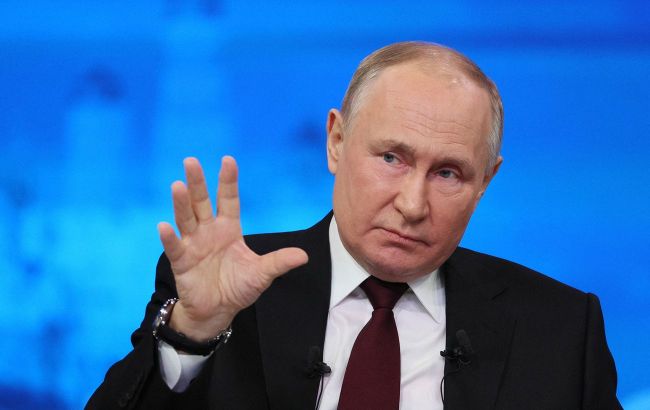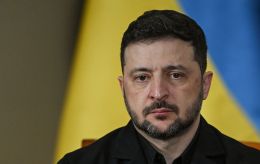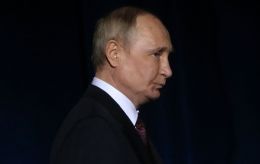Kremlin responds with nuclear threats to Trump’s call to strengthen EU defense - ISW
 Russian President Vladimir Putin (Photo: Getty Images)
Russian President Vladimir Putin (Photo: Getty Images)
Russia is ramping up its nuclear rhetoric in an attempt to intimidate NATO and spread panic within the European Union. This information offensive from the Kremlin closely mirrors previous campaigns that preceded its invasions of Georgia and Ukraine, according to a report by the Institute for the Study of War (ISW).
The report notes that the Kremlin continues to issue baseless threats against NATO countries in response to their efforts to strengthen defense capabilities - moves prompted by US President Donald Trump's calls for Europe to take greater responsibility for its security.
It cites remarks made by Russian Security Council Secretary Sergei Shoigu in an interview with TASS on April 24. Shoigu accused Europe of allegedly preparing for military conflict with Russia within the next three to five years and of building up forces near the borders of Russia and Belarus.
Shoigu also accused European states of increasing their military presence near the western borders of the Union State of Russia and Belarus. He claimed that the EU seeks to become a military organization against Russia and expressed concern over rising military expenditures in Poland, Lithuania, and Estonia.
The Russian Security Council Secretary confirmed that Russia has deployed Oreshnik missiles on Belarusian territory and recalled changes to Russia’s nuclear doctrine made in November 2024. Under the new policy, the Kremlin permits the use of both nuclear and conventional weapons in the event of aggression against either Russia or Belarus.
The Institute for the Study of War (ISW) emphasized that Shoigu’s statements are aimed at deterring NATO. The report also reminded that Russian officials employed similar rhetoric ahead of the invasions of Georgia in 2008 and Ukraine in 2014 and 2022.
Clever threatening tactics
Kremlin spokesperson Dmitry Peskov, in an interview with the French outlet Le Point, denied Russia's aggressive intentions but simultaneously accused the Baltic states of discriminating against Russian-speaking populations. The Institute for the Study of War (ISW) pointed out that Moscow has repeatedly used this narrative to justify its military invasions.
Analysts noted that the countries Moscow labels as militarized - Finland, Poland, and the Baltic states - are all located near Russia’s borders and face the highest security threats. At the same time, the Kremlin is attempting to exert informational pressure on the West to reshape the European security architecture to suit its interests.
ISW believes that Shoigu’s nuclear threats are part of a broader informational and psychological campaign of reflexive control, aimed at influencing decision-making in Western countries. Such statements may be designed to pressure European states into scaling back their defense programs, thereby weakening NATO’s eastern flank.
According to experts, this strategy aligns with Russian President Vladimir Putin’s demands made in 2021, just before the full-scale invasion of Ukraine, when he called for NATO to refrain from deploying troops in countries that joined the Alliance after 1997.
“Peskov's and Lavrov's threatening statements against NATO members Finland, Poland, Estonia, Latvia, and Lithuania parallel other Kremlin officials' statements likely intended to set information conditions to support Russian efforts to seize territory in Eastern Europe, the South Caucasus, and Central Asia,” the ISW report states.
Justification of the new aggression
The Institute for the Study of War (ISW) also drew attention to remarks made by Russian Foreign Minister Sergey Lavrov, who claimed that fascists are allegedly taking over territories that once belonged to the Russian Empire or the Soviet Union. In addition, they noted threats made by Nikolai Patrushev, a presidential aide, directed at Finland.
The ISW concluded that such statements indicated the Kremlin's continued perception of those territories as part of its sphere of influence, suggesting that this stance could potentially be used to justify future acts of aggression.
Kremlin's "peacekeeping" initiatives
The administration of US President Donald Trump, along with several European countries, was reportedly engaged in active negotiations to end the war in Ukraine.
Ahead of the April 24 meeting in London, Washington allegedly presented a seven-point peace plan. Under this proposal, Ukraine would recognize Crimea and some occupied territories as Russian and abandon its NATO aspirations. In return, the US would lift sanctions against Russia, while the Kremlin would "freeze" the war.
However, Ukrainian President Volodymyr Zelenskyy firmly rejected this proposal from Washington.
Recently, Dmitry Peskov stated that if Ukraine were to withdraw its troops from the four partially occupied regions in the east and south, Russia would be ready to immediately halt the war.
According to the Financial Times, Putin was reportedly willing to give up claims to the four Ukrainian regions and proposed a ceasefire along the current front line as part of a rapid peace deal with Trump.
Moscow also called on Kyiv to remove obstacles to negotiations.

